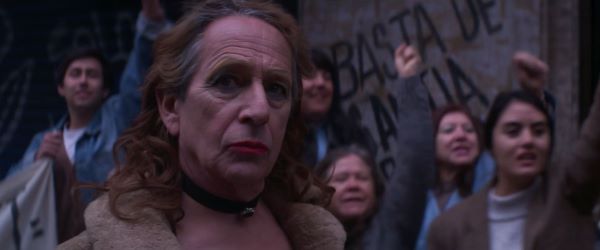
Set during the tense, suffocating Pinochet era in 1980s Chile, Rodrigo Sepúlveda’s My Tender Matador explores the unlikely alliance between an aging drag queen and a dashing revolutionary, each playing out their own notions of rebellion. Based on the novel by Pedro Lemebel, the character study vibrates with moments of plaintive charm and sincerity, despite the slightly forced arrangement at the heart of its all-important central relationship.
A rugged trans person, known only by the name of the Queen (Alfredo Castro), hangs out at her local disco when shots ring out. It’s a police raid—bullets fell one of her friends. Fleeing the cops in her high heels through the dark, the Queen is pulled out of their sight by a stranger from the bar, a handsome Che Guevara lookalike, Carlos (Leonardo Ortizgris). Carlos’s approach shifts from comradely to borderline amorous. What does this sexy, understatedly macho man want from the Queen?
As it turns out, to harbor revolutionary contraband in the Queen’s large, tumbledown apartment, shot as a sort of grainy, dusty lost paradise by cinematographer Sergio Armstrong. Carlos drags in crates of forbidden books to hide and starts inviting friends for “study sessions.” As the underground activity builds, so does a friendship with flirtatious overtones, deepening into shared confidences, risks, and pathos.
Never mind that Carlos’s judgment would have to be severely impaired to pick a flamboyant, indiscreet drag queen already in the sights of the police as a confidant, or her well-trafficked apartment building with its nosy landlady as a safe house. Or, that a hardened, street-smart target of the authorities like the Queen would turn a naïve, blind eye to the firearms clearly being smuggled into said safe house. Or that this pariah in Pinochet’s dictatorship would have any kind of rapport with a haughty society lady and Pinochet henchwoman. The hard-to-believes pile up and undermine a sense of the leads’ plight as outlaws in a repressive society.
At the same time, the story line loses its political edge. Queen delivers a revealing both-sides-do-it speech to his insurrectionary friend: “Us queens don’t care who’s on top, whether it’s military or communist, whatever. For them we’ll always be a bunch of fucking fags.” Still, the drag queen joins a demonstration, which Armstrong shoots as though Queen is walking disembodied through a dream. In this sequence, a shot of stoic, ordinary protesting moms standing in a line holding pictures of their missing children expresses more about political repression than anything Queen or Carlos could ever say.
Perhaps aware that the high stakes have been lowered, the film turns from a semi-political thriller into an examination of Carlos and the Queen’s rapport. The two banter and feint in some winning interludes, including a picnic that opens up the claustrophobia of many of the film’s scenarios, though it ends in gunshots. But what does this pair really get from each other? Carlos seems amused by the drag queen’s attention and sly cackles, played up to the hilt by Castro. For her part, Queen is beyond besotted with the hunky straight guy. Egos may be more in play than shared values. Perhaps the film’s ambivalence is a message that relationships are often hard to define, even for those in them.
Not quite a political thriller, not exactly a romance, and (given a furtive sexual interlude) suspicious as a story of friendship, My Tender Matador can be a hard film to figure out. But its steeps in a very particular world, and its moments of connection and wit keep it engaging, labels aside.
















Leave A Comment